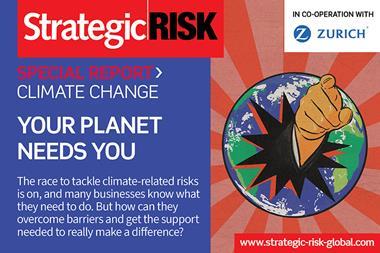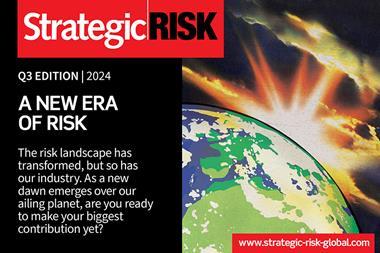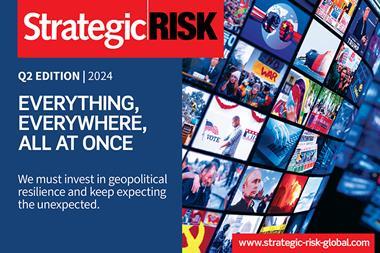New risk realities arising in the post-COVID world will demand very new risk solutions. This is our moment.
We’re all used to being told to innovate to stay relevant. But as countries emerge from lockdown, the world is more altered than ever previously imagined. New risk realities will demand very new risk solutions. This is our moment.
The most pressing concerns as lockdown lifts are likely to be the operational challenges of navigating a recession, restarting facilities and supporting staff as they return to work. But strategically, big macro challenges such as climate change, the speed of technological change and changing consumer behaviour loom large have not gone away.
As our own research indicates (in our Climate Change report on page 23), businesses are making important strides when it comes to climate change, with nearly three-quarters of boards engaged with the physical and transition risks it presents. But there is a long way to go, and a fear the current crisis could divert attention and resources away from adapting business models and building greater resilience to natural perils.
But in a post-COVID world, some business may already be further on track with decarbonisation than they imagined. As lockdown ends, companies may question the need for vast office spaces after a successful adjustment to remote working. They may look to replace all but the most essential business travel with video conferencing, now everyone has got to grips with the technology!
It is a further leap into an intangible world. A world where business disruption does not hinge upon property damage and where traditional insurance products must clearly innovate to reflect new risk realities. In this second quarter edition of StrategicRISK magazine we explore how the crisis has exposed the limitations of business interruption. How it is not responding to a whole gamut of disruptive sources, whether this arises within the supply chain, IT systems or through a loss of attraction.
Words like ‘nimble’ and ‘agile’ are often flung about when discussing necessary attributes for innovation. But these are traits companies must have if they are to survive in the new economy. Post COVID-crisis, some traditional business models are already appearing irrelevant. The future of industries such as shale gas and oil sands extraction hang in the balance, with predictions the price of crude oil may never recover.
Risk management reports frequently highlight the cautionary tales of companies that failed to anticipate change. Kodak’s missed opportunity to embrace digital photography and Blockbuster’s inability to counter the threat of video streaming. History is littered with the remnants of brands that failed to see around corners, or ploughed on regardless, like giant oil tankers unable - or unwilling - to change their course.
By demonstrating its value during the pandemic, the risk management profession is in a strong position to lead the way forward, to scan the horizon and communicate the risks and opportunities the future holds. There is a good argument that now is the time for risk managers to be more broadly elevated to the C-suite, as chief risk officers, ensuring risk remains at the heart of all senior decision-making.
As Laura Langone, president of RIMS and head of insurance operations at Airbnb, writes in our Viewpoints section of this edition: “Now more than ever, risk professionals must continue to be strong communicators, problem solvers and strategic thinkers. They must step out of their comfort zones, challenge norms and not settle for reporting to corporate Boards but rather aspire to serve on them.”
Time to step out and step into that spotlight.
Also in this edition
ANALYSIS
HONG KONG: RENEWED TENSION
Proposed changes to national security laws are leading to more protests. But could they be a good thing for business in the region?
CLAMPDOWN ON CLASS ACTIONS
The Australian government is getting tough on litigation funders as D&O actions surge.
VIEWPOINTS
Top risk experts share their perspectives on the unique learning opportunities the COVID-19 crisis has presented the risk community.
RISKS
BUSINESS: INTERRUPTED
Risk managers must rethink the coverage their businesses need in light of BI policies that have turned out to be incompatible with non-damage sources of disruption.
PARTNERS AGAINST PANDEMICS
Could the answer to future pandemic coverage be found in a collaboration between governments and insurers?
PROFILE
Steve Tunstall has seen the Asia-Pacific risk world grow from infancy. He shares his thoughts on a future built around technology.
FOCUS
RISK PROFESSIONAL 2.0
Many focus on the need for tech expertise in the next generation of risk players, but inter-personal skills will prove to be just as essential.
FUTURE OF BUSINESS
As part of our ongoing Future of Business series, we explore international insurance programmes as they grow in appeal for mid-sized companies.
SPECIAL REPORT: CLIMATE CHANGE
A TRULY GLOBAL RISK
Our most in-depth and enlightening coverage of climate change risk yet, including exclusive survey data, deep-dive analysis and expert insights.
KEEPING THE FLOW
Thames Water’s Richard Hoult discusses the challenges of resource scarcity as climate extremes become more common and population growth continues.
Downloads
SRGlobalQ22020 ALLPAGES_web2
PDF, Size 8.82 mb




















No comments yet